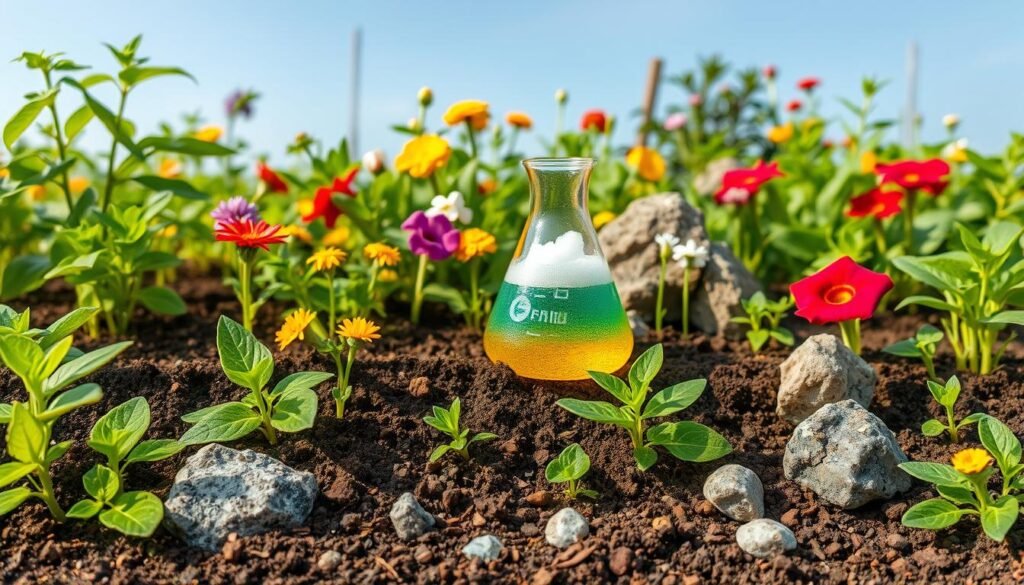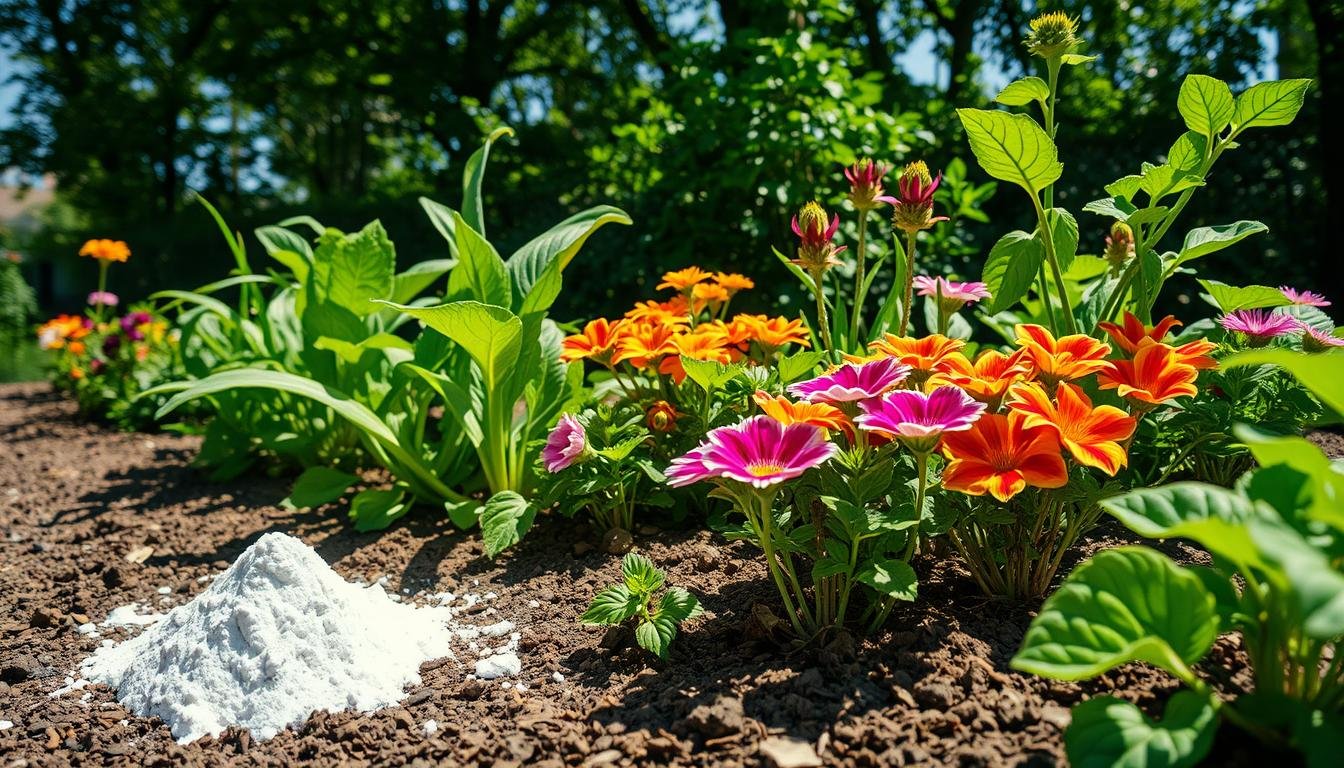Exploring is calcium carbonate good for gardens shows its valuable role in boosting soil and plant health. Many gardeners rely on calcium carbonate to improve soil quality, and it’s widely used beyond gardening since it’s a significant part of the Earth’s crust.
In gardening, calcium carbonate does more than enrich the soil. It’s a primary ingredient in garden lime, which helps balance soil acidity—a key factor for plant health, especially in regions like North Carolina, where soil tends to be too acidic. By understanding how calcium carbonate impacts soil, gardeners can make more informed decisions to support plant growth.
This guide will walk you through the benefits of calcium carbonate for your garden and offer tips for growing stronger, healthier plants.
Key Takeaways
- Calcium carbonate is crucial for soil amendment and plant nutrition.
- It helps neutralize acidic soils and encourage optimal plant growth.
- This compound is a primary ingredient in agricultural lime.
- Regular application can enhance overall soil health and fertility.
- Understanding pH levels is key to effective calcium carbonate application.
Table of Contents
Understanding Calcium Carbonate
Calcium carbonate is key in gardening and soil health. Knowing what it is and where it comes from helps gardeners a lot. It’s a natural mineral that makes soil better and healthier.
What is Calcium Carbonate?
Calcium carbonate is made up of limestone, chalk, and dolomite. These make up about 4% of the Earth’s crust. It dissolves a bit in water, found in many natural waters. In gardening, it gives plants calcium and helps control soil pH.
Soils with calcium carbonate can change their acidity levels. This affects plant health a lot.
Common Sources of Calcium Carbonate
There are many natural sources of calcium carbonate for gardens. Agricultural lime is a main one, lowering soil acidity and adding calcium. Dolomitic lime adds magnesium too, improving soil structure.
Bone meal fertilizer gives plants calcium and phosphorus, helping with flowers and fruits. Hardwood ashes are also rich in calcium carbonate but must be used carefully to avoid too high pH.
Using products like agricultural lime has made my garden better. Knowing about these sources helps manage nutrients and grow a better garden.
| Source | Benefits | Notes |
|---|---|---|
| Agricultural Lime | Reduces soil acidity, provides calcium | Highly reactive in acidic soils |
| Dolomitic Lime | Enriches soil with calcium and magnesium | Affects soil structure positively |
| Bone Meal | Provides calcium and phosphorus | Ideal for fruiting and flowering plants |
| Hardwood Ashes | Contains calcium carbonate | Can overly raise soil pH |
Calcium Carbonate in the Garden
Calcium carbonate is great for gardens. It makes the soil better and helps plants grow. It adds calcium, improves water use, and helps plants get nutrients.
Natural Soil Amendment
Calcium carbonate makes soil better. It helps roots get water and nutrients. It also makes the soil less acidic, which is good for plants.
Role in Plant Nutrition
Calcium is key for plants. It helps with cell walls, root growth, and plant health. Gardens with calcium carbonate have stronger plants and more food.
| Benefit | Description |
|---|---|
| Improves Soil Structure | Enhances aeration and drainage, preventing compaction. |
| Neutralizes Acidity | Reduces soil pH, making it less acidic. |
| Enhances Nutrient Uptake | Improves absorption of essential nutrients by plants. |
| Supports Root Development | Aids in the development of strong and healthy root systems. |
| Promotes Disease Resistance | Strengthens plant structure against diseases and pests. |
Is Calcium Carbonate Good for Gardens?
Calcium carbonate is key for healthy garden soil. It boosts your garden’s health. We’ll look at how it helps soil and adjusts pH levels.
Benefits for Soil Health
Calcium carbonate has many soil health benefits. It makes nutrients easier for plants to use. It also helps soil microbes thrive.
Soil with more calcium holds nutrients better. This is good for plant growth.
- Improved nutrient absorption
- Increased microbial activity for a healthier soil environment
- Enhanced moisture retention through improved soil structure
Effects on Soil pH
Calcium carbonate is great for adjusting soil pH. It makes soil less acidic. This helps plants absorb nutrients better.
Soil with the right pH has more calcium. This is good for plant health. Soil tests can show how much calcium your garden needs.
| Soil Condition | Recommended Action | Expected Outcome |
|---|---|---|
| High acidity | Add calcium carbonate | Increased pH, enhanced nutrient availability |
| Magnesium deficiency | Use dolomite lime | Corrected deficiency, improved growth |
| Clay soil | Apply gypsum | Improved structure, enhanced drainage |
Calcium Carbonate and pH Levels

It’s key to know how calcium carbonate affects soil pH. This is crucial for a healthy garden. Calcium carbonate helps balance soil pH, making the garden better.
Impact on Soil Acidity
Soil acidity comes from hydrogen ions. Rainfall makes the soil more acidic by mixing with carbon dioxide. Fertilizers, especially nitrogen-based ones, also make it more acidic.
Legumes like soybeans add to this problem. Subsoils with low pH can make toxic elements like aluminum and manganese soluble. This harms plant growth.
Calcium carbonate helps by replacing harmful hydrogen ions with calcium ions. This keeps the soil pH healthy.
Determining the Right pH for Your Garden
Most plants do best in a pH between 6.0 and 7.5. Testing the soil regularly is important. This helps find out the pH and if there’s calcium carbonate.
In places like Utah, where calcium carbonate is common, testing is key. It shows if the soil needs adjusting. Based on the test, I can add the right amount of calcium carbonate. This helps plants grow well.
| Soil pH Range | Plant Health | Recommended Action |
|---|---|---|
| Below 5.0 | Risk of aluminum and manganese toxicity | Apply calcium carbonate to neutralize acidity |
| 5.1 – 6.0 | Suboptimal growth for some plants | Monitor pH and consider adding lime |
| 6.1 – 7.5 | Optimal for most crops | Maintain current soil conditions |
| Above 7.5 | High alkalinity; potential nutrient lockout | Use acidifying agents if necessary |
In summary, knowing how calcium carbonate affects soil acidity helps me create a healthy garden.
Garden Lime vs Calcium Carbonate
Knowing the difference between garden lime and calcium carbonate is key for gardening. Both are good for soil health but serve different needs. Garden lime, or agricultural lime, is mostly calcium carbonate. It makes soil less acidic.
Learning about differences in lime products helps me choose the right soil amendments. This is important for plant health.
Comparing Uses and Benefits
Garden lime is great for fixing acidic soils. It helps plants grow by adjusting pH levels. Quicklime, on the other hand, is too strong for gardens and can harm plants.
Here are the main benefits of garden lime:
- It raises soil pH, making it better for most plants.
- It makes nutrients more available, especially for plants like cabbage and broccoli.
- It stops clubroot disease in plants that don’t like acidic soil.
When to Use Which Product
Choosing when to use lime depends on soil tests. I use pH testing kits to check soil before applying lime. This avoids too much lime, which can harm plants.
It’s best to apply garden lime in autumn. This lets it work before spring. The amount needed changes based on soil type.
To get the best results, mix lime well into the top 20cm of soil. Using a fertilizer spreader for pelleted lime is good for lawns or beds. These steps help my garden grow better.
| Product | Composition | Ideal Usage | Plants Benefited |
|---|---|---|---|
| Garden Lime | Calcium Carbonate | To raise soil pH in acidic conditions | Cabbage, Brussels sprouts, broccoli |
| Calcium Carbonate | Calcium and Carbonate Ions | Soil amendment but varies in effectiveness | Most vegetables and fruits |
| Quicklime | Calcium Oxide | Avoid in garden soil due to high reactivity | None; not suitable for gardening |
Applying Calcium Carbonate in Your Garden
Soil testing for calcium carbonate is key for garden care. It helps check calcium levels and soil pH. This lets me know if my soil needs calcium carbonate to grow plants well.
How to Test Your Soil
Soil testing is important to know what nutrients your garden has. Professional tests show calcium and pH levels, which affect plant health. You can buy testing kits or get help from local offices.
The test results help choose the right soil amendments. This might include calcium carbonate based on your soil’s condition.
Recommended Application Methods
There are smart ways to use calcium carbonate in your garden. It’s important to follow the right steps for pH adjustments:
- For digging into the soil: apply 250g/m2 and top it off with additional sprinkling.
- To treat 4m2 of soil, 1 kg of calcium carbonate is recommended.
- For larger areas, such as 100m2, consider 25 kg for an even application.
Timing is key when amending your garden soil. Apply during the growing season for best results. I aim for a pH of 7.0 to help plants absorb nutrients well.
Calcium carbonate comes in powder or granules, depending on your needs. By using these methods, I can improve my garden’s soil. This helps my plants grow healthier and stronger.
Signs of Calcium Deficiency in Plants
Calcium is key for plants to grow well. It helps with many important functions. If plants lack calcium, they show signs that stop them from growing. Knowing these calcium deficiency symptoms in plants is vital for gardeners to keep their plants healthy.
Symptoms to Look For
Finding calcium deficiency early can stop big problems with your plants. Look out for:
- Necrosis: This causes young leaves to turn brown and fall apart.
- Blossom-end rot: This is common in tomatoes, peppers, and eggplants, making fruits bad to eat.
- Stunted root development: Without enough calcium, plants can’t take in water and nutrients well.
- Plants grow slower and are smaller than usual.
- Fruits are deformed or not good quality, hurting your harvest.
- Plants get sick easier because their cell walls are weak.
Addressing Deficiency Issues
To fix calcium deficiency symptoms in plants, you need to act fast. Here are some ways:
- Use calcium supplements like calcium carbonate and gypsum to fix nutrient levels.
- Make sure you’re using the right fertilizer to keep calcium in the soil.
- Keep the roots healthy to help plants take in nutrients.
- Control how wet or dry the soil is to keep plants healthy.
Check your soil often and do tests to find out if you’re missing nutrients. For more tips on keeping your soil healthy and your plants happy, see this resource on calcium for plants.
Spotting and fixing calcium problems helps your plants grow strong and produce well. Ignoring these signs can lead to failed crops or lower quality. So, it’s crucial to watch your plants’ calcium levels closely.
Environmental Impact of Calcium Carbonate
Calcium carbonate does more than help my garden. It’s good for the planet too. It helps make gardens and the planet healthier. It’s great for fighting acid rain and keeping soil healthy for a long time.
Role in Neutralizing Acid Rain
Calcium carbonate is key in fighting acid rain. Acid rain comes from pollutants in the air. When I use calcium carbonate on my soil, it makes the soil’s pH more balanced.
This helps the soil support more plants and tiny life. It makes the ecosystem healthier.
Long-term Soil Health Benefits
Using calcium carbonate helps my garden grow better over time. It makes the soil better at holding water and nutrients. This helps plants grow strong and healthy.
Healthy plants help fight climate change by storing more carbon. Using calcium carbonate the right way keeps the soil balanced. This helps my garden grow even more.
Conclusion
Calcium carbonate is great for gardens. It helps soil health and feeds plants well. It makes soil pH just right for many plants to grow well.
Using calcium carbonate, I’ve seen better yields and more nutrients. It makes the soil ready for plants to grow.
It also helps with soil compaction and boosts microbes. But, too much can upset the soil’s balance. Testing the soil is key to using it right.
Calcium carbonate is good for gardens if used wisely. It makes soil better and helps gardens grow well. It’s a key part of good gardening.




